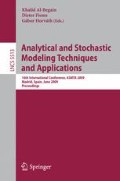Abstract
This paper studies a single-server queue with two traffic classes in order to model Expedited Forwarding Per-Hop Behaviour in the Differentiated Services architecture. Generally, queueing models assume infinite queue capacity but in a DiffServ router the capacity for high priority traffic is often small to prevent this traffic from monopolizing the output link and hence causing starvation of other traffic. The presented model takes the exact (finite) high-priority queue capacity into account. Analytical formulas for system contents and packet delay of each traffic class are determined. This requires extensive use of the spectral decomposition theorem as the service time of a high-priority packet takes a general distribution, which complicates the analysis. Numerical examples indicate the considerable impact of the finite capacity on the system performance.
Access this chapter
Tax calculation will be finalised at checkout
Purchases are for personal use only
Preview
Unable to display preview. Download preview PDF.
References
Carpenter, B.E., Nichols, K.: Differentiated services in the Internet. Proceedings of the IEEE 90(9), 1479–1494 (2002)
Walraevens, J., Steyaert, B., Bruneel, H.: Performance analysis of a single-server ATM queue with a priority scheduling. Computers & Operations Research 30(12), 1807–1829 (2003)
Demoor, T., Walraevens, J., Fiems, D., Bruneel, H.: Mixed finite-/infinite-capacity priority queue with interclass correlation. In: Al-Begain, K., Heindl, A., Telek, M. (eds.) ASMTA 2008. LNCS, vol. 5055, pp. 61–74. Springer, Heidelberg (2008)
Meyer, C.D.: Matrix Analysis and Applied Linear Algebra. Society for Industrial and Applied Mathematics, 599–615 (2000)
Van Velthoven, J., Van Houdt, B., Blondia, C.: The impact of buffer finiteness on the loss rate in a priority queueing system. In: Horváth, A., Telek, M. (eds.) EPEW 2006. LNCS, vol. 4054, pp. 211–225. Springer, Heidelberg (2006)
Takagi, H.: Queueing Analysis. Discrete-Time Systems, vol. 3. Elsevier Science Publishers, Amsterdam (1993)
Fiems, D.: Analysis of discrete-time queueing systems with vacations. PhD thesis. Ghent University (2003)
Author information
Authors and Affiliations
Editor information
Editors and Affiliations
Rights and permissions
Copyright information
© 2009 Springer-Verlag Berlin Heidelberg
About this paper
Cite this paper
Demoor, T., Walraevens, J., Fiems, D., De Vuyst, S., Bruneel, H. (2009). Mixed Finite-/Infinite-Capacity Priority Queue with General Class-1 Service Times. In: Al-Begain, K., Fiems, D., Horváth, G. (eds) Analytical and Stochastic Modeling Techniques and Applications. ASMTA 2009. Lecture Notes in Computer Science, vol 5513. Springer, Berlin, Heidelberg. https://doi.org/10.1007/978-3-642-02205-0_19
Download citation
DOI: https://doi.org/10.1007/978-3-642-02205-0_19
Publisher Name: Springer, Berlin, Heidelberg
Print ISBN: 978-3-642-02204-3
Online ISBN: 978-3-642-02205-0
eBook Packages: Computer ScienceComputer Science (R0)

